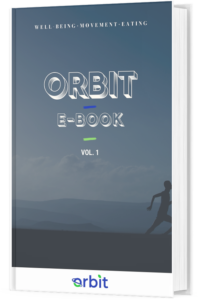Learning how to honor your hunger signifies that you learn to respond to your body’s needs when it exhibits its first signs of hunger. Responding to your first biological signs will allow you to make conscious decisions on how much food your body wants and needs.
Intuitive Eating1 is a book, created by Evelyn Tribole and Elyse Resch, that presents 10 principles to create a healthy relationship with your food, body, and mind. The 10 principles build upon one another. Work on every principle one by one. If you have not read the Principle #1, please refer to it before getting into this article.
Why should you honor your hunger?1,2,3
Food is essential to our survival. Humans have a biological mechanism that is triggered when their body’s needs are not met. When hunger is ignored, the biological drive to eat is turned on – physically and psychologically. We have all experienced the feeling of being “hangry”. The nerve cells that control our eating are located in the brain. This explains why being hungry affects our mood, sex lives, in addition to our physical state.
What does the biological drive to eat do? A chemical produced in the brain triggers a desire to eat carbohydrates NOW. Why carbs? Carbs are our body’s preferred source of energy as we can use it quickly and store lots of it! If you ignore that biological drive, your body will crave carbs even more. Once you decide to eat, after having ignored your desire, you may find yourself binging on carbs, or eating much more than usual. This is normal as this is how our bodies are wired when put through a state of “starvation”.
What about long-term fasting?1,3
It is counterproductive for our brain’s chemicals and to our metabolism to fast. Fasting may harm your body. If you fast for one day, your liver glycogen stores will be exhausted. This means that your body will not have its preferred source of energy to fuel your body. It will go get its energy from your fat store, or your lean tissue, meaning your muscles! You may think you are losing weight after 2 days of fasting, but it is mostly water loss, and perhaps, muscle loss.
What is ketosis?1
Ketosis is when your body converts your fat into ketones, which is usable energy for your body. Fasting, or restricting carbs, will ultimately convert your stored fat to ketones. It may be harmful as only half the brain’s cell can use ketones for energy. This means that the part of the brain that cannot use ketones for energy must use your lean tissue, or your muscle’s protein, to adequately respond to your brain’s needs. Your body will use your muscle tissue as a source of energy for your brain!
Warning: If high levels of ketones are used for energy, it is extremely dangerous for people with diabetes.
Main message: Fasting, depriving, undereating, or ignoring your hunger signals for longer periods of time will slow your body’s basal metabolic rate. Your basal metabolic rate is the total energy expended (calories) on all involuntary activities to stay alive, such as regulating your body temperature, or breathing. This means your body will use less calories to stay alive, out of “fear” of being deprived again.
+ Eating in response to initial hunger improves health and weight5,4
Hunger Signal6
Taking the time to listen to your hunger signals is a great start. Here are some normal signs of hunger: Gurgling, lightheaded, headache, growling sounds. As you can notice, hunger is physical and psychological.
Before eating, ask yourself: “Am I hungry?” or “where am I at on the hunger scale?”.

If you are at 3 or 4, start eating.
As you eat, take breaks and ask yourself where you are at on the scale. You may consider to stop eating at 6 or 7.
What if I don’t feel my hunger?
It is possible you do not feel your hunger signals. This may happen if you have gotten used to ignoring your hunger cues or if you have super busy days and do not have time to stop and think about your hunger. Taking the time to stop and eat throughout the day may be extremely beneficial as you may only be realizing how hungry you are in the evening and eat more than usual in one sitting. If you do not feel your hunger, a good rule of thumb is to eat every 4 to 5 hours.
Be Aware of the Other Reasons you May Feel Hungry1
- Taste hunger
Taste hunger means that you are eating because it smells, sounds, and looks delicious. For example, it is your birthday, your father just cooked an decadent meal and your grandmother baked your favorite chocolate cake. After the meal, you ask yourself where you are at on the hunger scale. You are at a 7. Despite no longer being hungry, you decide to take a piece of the cake because you know it will be delicious. Taking the piece of cake would be out of taste hunger and it is used in almost every culture. It is normal that you may not always be hungry when you eat.
- Practical hunger
Practical hunger means that you eat at a specific time, despite not being hungry, for practical reasons. The practical reason might be that you know you will not have time to eat when your hunger will actually kick in.
- Emotional hunger
Once you identify your hunger signals, you may realize that you sometimes eat for emotional reasons, such as sadness, boredom, anger. A good trick to identify emotional eating is to ask yourself: “Why am I eating?” before you start eating as well. If the answer is: “I am hungry!”, eat! If the answer is: “I am stressed”, you may consider finding alternative solutions to solve your emotional issues because eating will not solve the problem. Some tricks for meeting your needs without using food are: writing your feelings in a journal, meditating, talking to someone that is willing to listen, engaging in physical activity, taking a walk in nature, reading a book, watching a movie. That being said, sometimes, eating will alleviate the emotional issue, and just make you feel better because the food is amazing.
Next Step: Read Principle #3.
References
1 Tribole, E., & Resch, E. (2012). Intuitive eating: A revolutionary program that works. St Martin’s Press.
2 Leibowitz, S. (1991). Brain neuropeptide Y: An integrator of endocrine, metabolic and behavioral processes. Brain Research Bulletin, 27, 333-337. https://doi.org/10.1016/0361-9230(91)90121-Y





